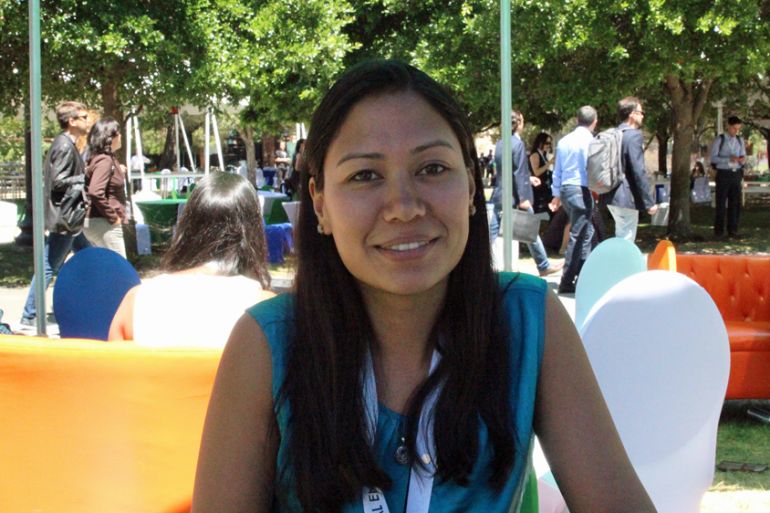Nepal: Medicine dissemination the new-fashioned way
Sumana Shrestha gave up a high-powered job in the US to return home and help heal survivors of the devastating quake.

Palo Alto, United States – Sumana Shrestha was working in Washington DC when word spread that a massive earthquake had devastated Nepal in April 2015, killing nearly 9,000 people.
Originally from Kathmandu, she immediately realised her people needed help and began organising donations and medical-supply deliveries through Facebook.
Keep reading
list of 4 itemsThe inexplicable rise of kidney disease in Sri Lanka’s farming communities
Europe endured record number of ‘extreme heat stress’ days in 2023
Deadly Sahel heatwave caused by ‘human-induced’ climate change: Study
Her employer at the time, Boston Consultancy Group, deployed her with the UN’s World Food Programme and Shrestha hit the ground to assist quake-stricken Nepalese, particularly those in cut-off rural areas with little in the way of aid.
After months of relief work, Shrestha made the ultimate sacrifice for her countrymen, quitting her comfortable, well-paid job in the United States to use her MIT-earned MBA to open the company Medication for Nepal, which works to get vital health supplies to those in desperate need.
Al Jazeera caught up with Shrestha at the recent Global Entrepreneurship Summit (GES) in California, where President Barack Obama in a speech praised her “company in Nepal that’s helping to improve charity healthcare”.
|
|
| Crowdfunding projects on the rise for start-up businesses |
Al Jazeera: How did you get into this line of work?
Shrestha: I was employed as a consultant for the Boston Consulting Group (BCG) when the earthquake hit and I went back to Nepal to help support relief and recovery. Thus far I’ve worked in many different sectors related to relief, from blanket distribution to medicine, and food.
I’ve supported 15 districts with 9.5 tonnes of medicines. That was relief work – giving it to district officials to disseminate. But what I discovered was much more work needed to be done and can’t just be solved by giving handouts. Even though that is critical and necessary, we need a longer-term solution, which is why I’m working to create a peer-to-peer platform for medicine support.
I’m not talking expensive medicines, just basic ones for fever, diarrhoea, gastronomic problems. If you look at statistics in Nepal, millions of people suffer from these diseases and can’t get access to medicine. For those in remote areas, 80 percent of healthcare facilities run out of medicine because of a lot of systematic problems.
So what I think we need is a solution that combines entrepreneurship to tackle these problems. It can’t be solved by traditional relief methods. What entrepreneurship means is innovation. You try, if it doesn’t work, then you try something else. You keep trying until you come to a solution that actually works.
So what I’m doing with the peer-to-peer network is to pre-position medicines in the districts, so when a person makes a two-day or four-day journey from mountainous regions to healthcare centres, they’ll have medicine when they arrive.
Whenever we give out medicine, we also take that person’s information and put it online for people to donate. What I’m trying to do is get Nepali people engaging, because it can’t be solved by just western world people supporting countries such as Nepal all the time. The amount of money that a person needs to get better is usually less than a dollar – 15 cents, 20 cents, 30 cents. This is something the Nepali people can afford, especially people in urban areas. This really connects people and that is the intangible I’m working hard to create.
Al Jazeera: How does being at the Global Entrepreneurship Summit help your cause?

Shrestha: It helps me validate my model, which is very important because if I’m going to go about it in a different way, I need a model that a lot of people have a chance to criticise with an opportunity to say how it can be made better.
I have also been introduced to a lot of people who have expressed strong support and who are going to introduce me to foundations who support causes like this. So it’s been very good in terms of networking opportunities. But GES has meant a lot more. A lot of the ideas I’ve heard from people here are so applicable to Nepal that I can bring back. My cause is I want to develop my country.
Al Jazeera: You gave up a nice life in the United States with a well-paid job to return to Nepal. Why did you do that?
Shrestha: I come from a very humble background, but where I am now is because I’ve been very lucky in my life. There have been people who supported me, the hard work has paid off. Whenever I’ve been sick, I’ve been able to get medicine. My dad was lucky enough to have two jobs so he could support the family. There are a lot of people who don’t have that. It’s so important to realise that it’s a circle. I am not where I am because of me, I’m where I am because of circumstances.
I came to the US in 2003 and every year or so I’ve gone back to keep the connection to my country. When the earthquake struck, that was a time I really felt ‘OK, that’s enough. I need to really go back and do something there.’
I’ve worked on Wall Street, I’ve got my MBA from MIT [Massachusetts Institute of Technology], worked for BCG, I’ve learned a lot. I know how to manage projects and these skills are very useful back home, knowing how to get things done. So that’s why I went back.
|
|
| New wave of Silicon Valley start-ups give back to community |